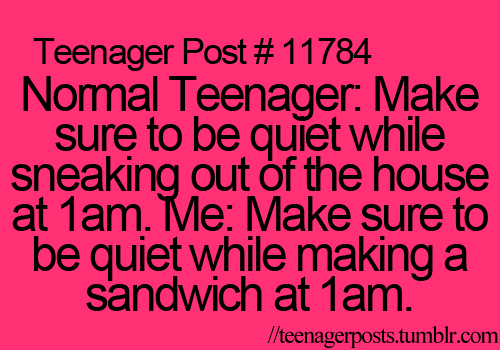It’s rather telling when several of the first
responses to a google search of the phrase “teens talk back” are several parenting
sites about controlling teen back-talk. This type of opinion permeates the
internet; one that others teenagers
as an out of control, rebellious, angst-ridden mess. A good portion of this
appears to come from adult internet users.
But a lot of it comes from teens, too.
In fact, many teenagers seem to possess a certain
amount of ageism against their peers, and they use various forms of social
media to assert their opinions. Amongst submissions by (supposedly) teenagers
for the “Teenagers” page of Urban Dictionary
were varying impressions. One user argues that teenagers are (quoting verbatim)
“Something im not proud to be, because a lot of teenagers are quite simply put;
idiots.” Another says that a teenager is “Someone who has everything but
appreciates nothing.” Conversely, a user claims they are “People who get no
respect and are looked down upon because some of us are idiots.” Another
discusses the issue in more detail, adding that “The word’s negative
connotations stem from the actions of the minority of adolescents who typically
display qualities and proclivities that can be construed as unappreciative,
lame, and otherwise emo.” Amongst the respondents, the general consensus seems
to be that “Like any age group, theres some good and some bad.” There’s this
idea that there are some bad
teenagers, but that most are okay.
Many of the users on the social media site Tumblr
appear to be teenagers, too. Sometimes they perpetuate teen stereotypes:

This one, similar the
opinions on Urban Dictionary, perpetuates the idea that other teenagers are rambunctious, but the teenager creating the
post is some exception to the rule. Others lament the state of teenage-hood with
quotes: “Teenagers are the most misunderstood people on Earth. We are treated
like children but expected to act like adults.” Youtube also offers an outlet
for teens to speak out. As we saw in a media artifact presentation, videos like
“Teens React” show depict various teen opinions. Others post their own homemade
videos, asserting their own autonomy in doing so.
Ultimately, while the media often promotes the
dominate ideology belittling and “othering” teens, it still exists as an outlet
for teenagers to talk back, even if it is in ways that both resist and reaffirm
these opinions. That teenagers have the agency and opportunity to utilize these
tools is at least a step in the right direction.
Comments/Questions:
Whenever I look over posts and opinions about/from
teenagers, I feel this weird disconnect. My experience never seemed to pay
attention to any of those stereotypes. I don’t remember cheerleader cliques or
football players ruling the school; it seemed like kids all just sat with their
friends at lunch, regardless. My table alone had people who were athletes, band
members, techies, etc., but that wasn’t what labeled them. Athletes (like cheerleaders)
only wore their uniforms on game-days. Chorus and band kids weren’t treated as
social outcasts; in fact, most athletes and A.P. students overlapped with
various extracurriculars. It wasn’t one
or the other; it was band and football. Nobody (from my observations) seemed to
care about any of that. Or maybe it was just me who didn’t, and I projected my
beliefs on my classmates. But even as
a teenager, I didn’t think teenagers were some weird, alien thing, as it seems
so many teens think today.
Anyway, what were your memories of high school and
teenage-hood? Did you see these stereotypes in the flesh?
Great Post! I found similar results, especially the ideas of teens doing the teen bashing, and "me vs them." I find it so weird that there is so little resistance to the discourse specifically about teens... yet teens plenty in other ways for other topics
ReplyDeleteMy experience was definitely not the norm. There a total of 100 students in the entire student body... there wasn't room to stick to cliques... they were groups but everybody mixed...